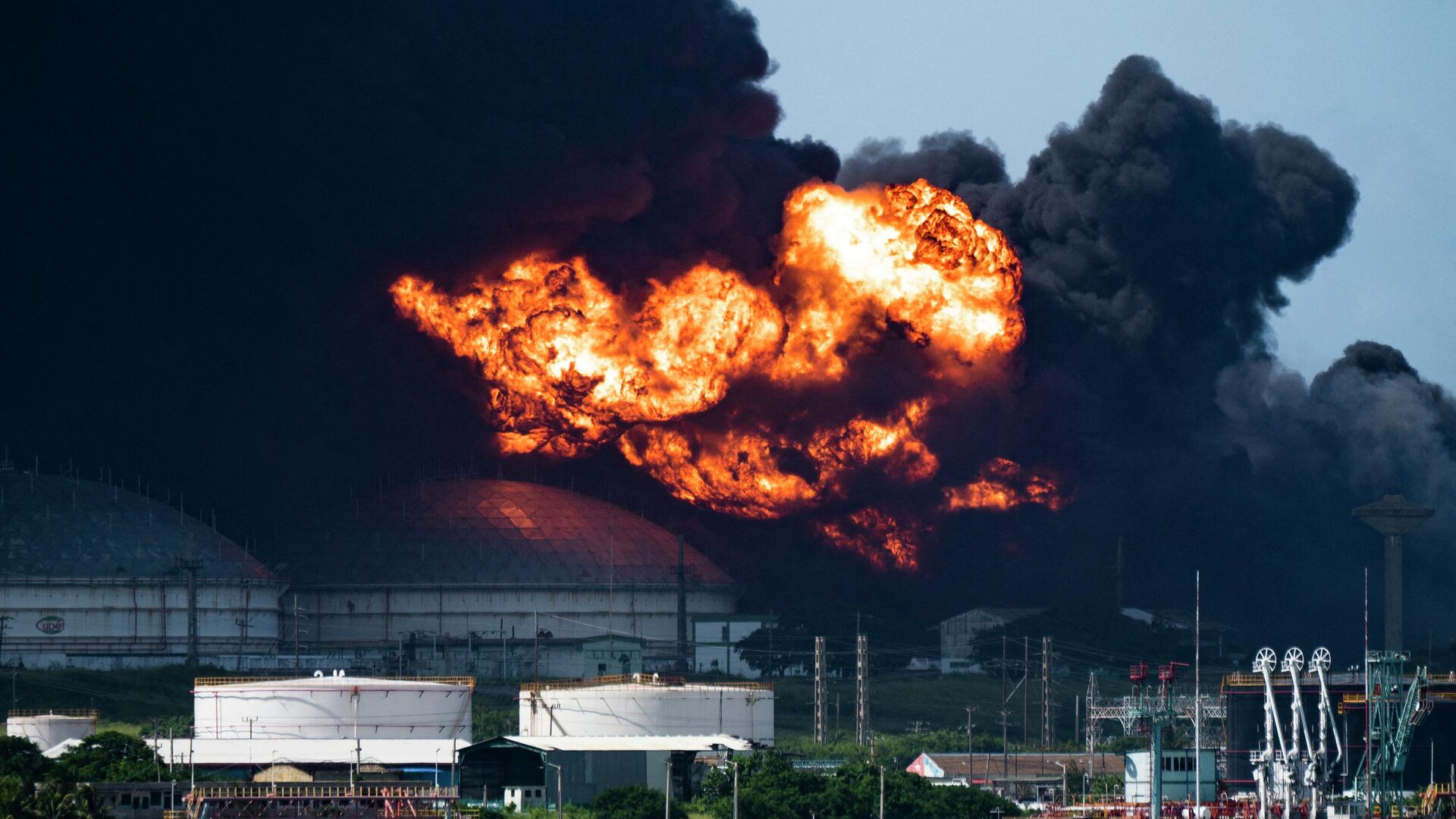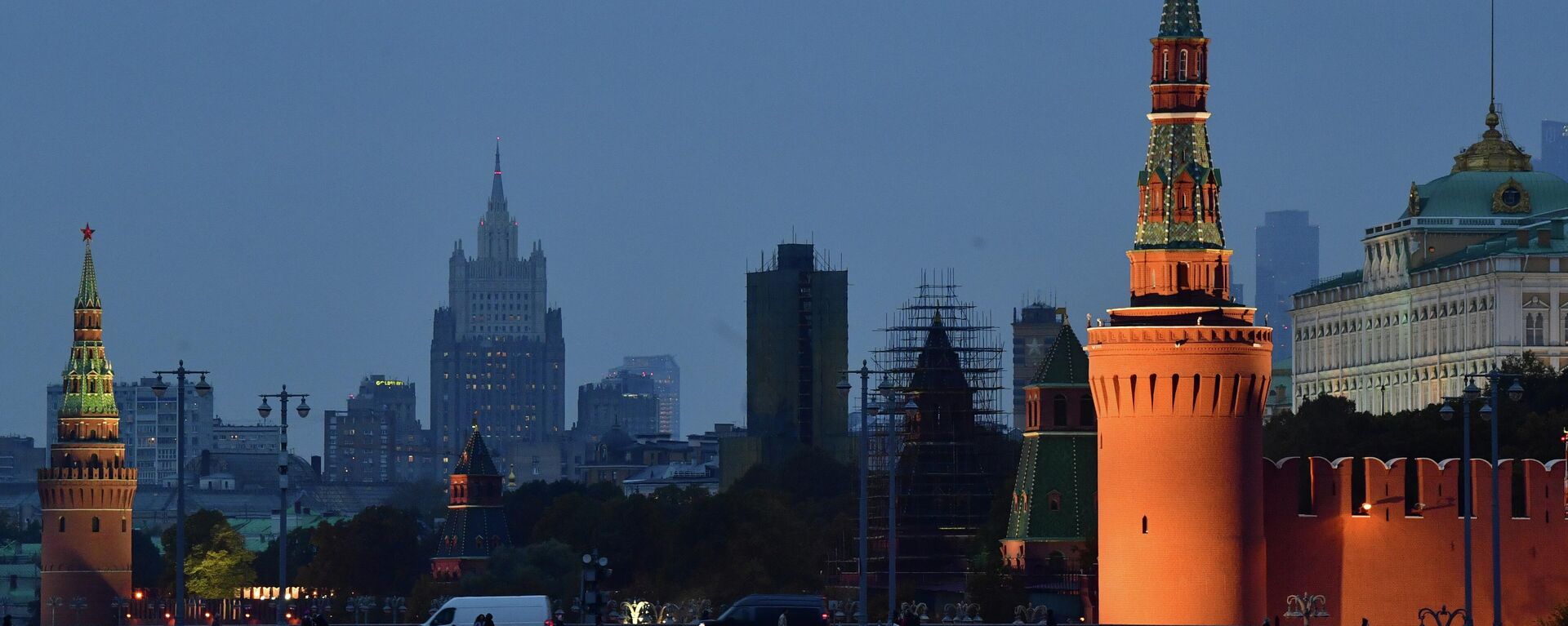Cuba Gains Control of 'Worst-Ever’ Blaze That Killed 2, Crippled Country’s Energy Infrastructure

© AFP 2023 / YAMIL LAGE
Subscribe
With plenty of help from Mexico and Venezuela–and without sanction relief from the US–Cuban authorities have finally contained the deadly blaze that consumed half the storage capacity of their main oil hub.
Cuban officials say they’ve managed to control the fire which they called the worst in the country’s history, after an arduous 5-day firefighting operation at a key energy hub in Matanzas that involved three countries and cost at least two lives.
Elier Correa, joven oficial del Cuerpo de Bomberos de #Cuba, otro héroe de la hazaña en #Matanzas, falleció anoche, tras varios días en estado crítico. Gracias a la proeza de hombres como él, se controló el incendio. Mis condolencias a sus seres queridos. pic.twitter.com/t1Ej1IQghU
— Miguel Díaz-Canel Bermúdez (@DiazCanelB) August 11, 2022
Within days of the Matanzas Supertanker Base being struck by lightning on August 5, the blaze quickly spread out of control and managed to consume four of the facility’s eight total storage tanks. It’s a crucial part of Havana’s energy infrastructure; since it’s the only terminal able to receive large oil tanks, most of the oil imported into Cuba arrives via Matanzas, and serves as the country’s largest oil storage facility.
The resulting diminished storage capacity is likely to be a serious headache for a government that relies heavily on oil for energy and has already been forced to ration power in much of the country due to chronic fuel shortages this year.
🇨🇺 Primeras imágenes áreas tras el incendio en la base de Supertanqueros de Matanzas. pic.twitter.com/fY3XltZ3ER
— Cubadebate (@cubadebatecu) August 9, 2022
According to many of Cuba’s supporters, the source of such problems is obvious: the US government’s 63-year blockade. Even the cause of the blaze itself can be traced to US policy with regard to its closest island neighbor, according to the Wall Street Journal.
The Journal wrote Thursday that “lightning fires are unusual at oil facilities in the Gulf of Mexico, which have advanced technology to prevent lightning strikes, but the US embargo on Cuba makes it almost impossible for Cuba to acquire this technology.”
For that claim, the Journal cites Lee Hunt, the general partner of energy-policy advisory firm Hunt Petty LP, who explained that “in every area related to Cuba’s energy sector, the [US] embargo has hampered their ability to operate and perform in an equivalent way to the US or its regional peers.”
When neighbors like Venezuela and Mexico immediately sprung into action, sending teams of top firefighters and tens of thousands of gallons of firefighting foam, the US declined to send any material aid to Cuba.
“So far,” the only thing the “US offered” was “a phone number to an emergency local authority,” noted Johana Tablada, the Cuban Foreign MInistry’s deputy director for US affairs. “The rest is old same US abyss saying/acting.”
Cubans abroad hoping to help organize relief for their friends and families at home quickly found that US sanctions prevented them from doing even that. On August 9, Daniesky Acosta, a London-based organizer with Cubanos en UK, reported his GoFundMe campaign had been removed by the site’s owners for supposedly violating the terms of service. According to GoFundMe’s website, “in some cases, US sanctions, or sanctions from other relevant government bodies will prohibit us from supporting a fundraiser for some causes.”
An open letter signed this week by a number of notable figures including Cornel West, Jeremy Corbyn, Noam Chomsky, and Roger Waters urged the Biden administration to “lift all sanctions that prevent Cuba, directly or indirectly, from receiving essential medical, humanitarian, and environmental relief or receiving financial and other assistance,” to remove Cuba from the State Sponsors of Terrorism List, and to provide “direct and urgent assistance.”
But the pain might be the point, according to Fulton Armstrong, who was at one point US intelligence’s most senior analyst on Latin America. He told the Guardian this week there are “fears among supporters of a return to the normalization process launched by President Obama that the [Biden] administration is … privately hopeful that the energy and other problems are a test that ‘the regime’ fails.”
So far, just three lonely voices in Congress have spoken out against US sanctions on Cuba in light of the Matanzas fire: House Rules Committee Chair Jim McGovern (D-MA), House Foreign Affairs Committee Chair Gregory W. Meeks (D-NY), and House Appropriations Subcommittee on State and Foreign Operations Chair Barbara Lee (D-CA).
On Wednesday, the trio called on Biden to “immediately offer the appropriate assistance to facilitate international response efforts” and “suspend any relevant sanctions in order to expedite such a response,” noting that “now is the time to put politics aside and prioritize humanitarian engagement, environmental protection, and regional cooperation.”




